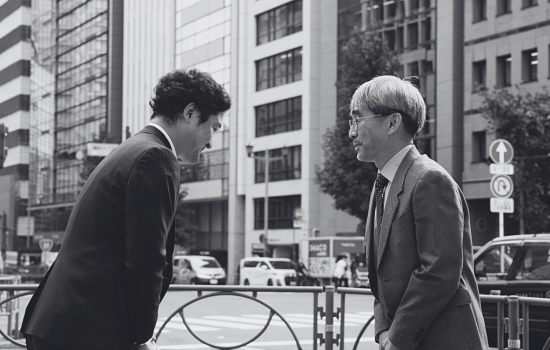The difference between “ありがとうございます” and “ありがとうございました” can be a bit confusing. By understanding the subtle difference, you can use these phrases more accurately in daily conversations.
ありがとうございます (Arigatou gozaimasu)
Present tense
- Usage: This phrase is used when expressing gratitude for something that is currently happening or has just happened. It’s often used in situations where the event or favor is still relevant or ongoing.
ありがとうございました (Arigatou gozaimashita)
Past tense
- Usage: This phrase is used when the event or favor has already been completed. It often conveys a sense of closure, implying that the situation or action being thanked for is in the past.
A clear point to understand is that native speakers often use ‘ありがとうございました’ as a way to close or wrap up a conversation or interaction.
e.g.
Situation 1
Aさん: こんにちは!おじゃまします。
Bさん: いらっしゃい。どうぞ、入(はい)ってください。
Aさん: これ、私(わたし)が作(つく)った野菜(やさい)です。どうぞ。
Bさん: わぁ!ありがとうございます。
— “Hello! Sorry to bother you.”
— “Come on in, please.”
— “These are vegetables I grew. Please have some.”
— “Wow! Thank you.”
Explanation:
In this situation, Bさん is currently receiving the vegetables from Aさん, so “ありがとうございます” is used. Using “ありがとうございました” here would be incorrect.
later,
B: コーヒーでいいですか?
A: はい。ありがとうございます。
— “Is coffee okay?”
— “Yes. Thank you.”
Explanation:
Here, Bさん is offering coffee, and Aさん is thanking for that offer. Since this is happening right now, “ありがとうございます” is appropriate. Using “ありがとうございました” would be incorrect.
later,
A: そろそろ、帰(かえ)らなきゃ。コーヒー、ごちそうさまでした。ありがとうございました。
B: いえいえ、こちらこそ野菜(やさい)をありがとうございました。また来(き)てくださいね。
— “It’s about time for me to leave. Thank you for the coffee.”
— “No, thank you for the vegetables. Please come again.”
Explanation:
Here, both Aさん and Bさん are wrapping up their time together, so they use “ありがとうございました” as a way to close the conversation. While “ありがとうございます” would also be natural, native speakers tend to prefer “ありがとうございました” in such situations. It conveys not just current gratitude but also reflects on the past, making it more polite and formal. Therefore, “ありがとうございました” is often used when parting.
The next day,
Aさん: 昨日(きのう)はありがとうございました。たくさん話(はな)せて、楽(たの)しかったです。
Bさん: 私(わたし)も楽(たの)しかったです。おいしい野菜(やさい)もありがとうございました。
— “Thank you for yesterday. I enjoyed talking a lot.”
— “I enjoyed it too. Thank you for the delicious vegetables.”
Explanation:
Both Aさん and Bさん are thanking each other for something that happened the previous day, so they use “ありがとうございました.” Using “ありがとうございます” here wouldn’t be incorrect, but “ありがとうございました” feels more natural and polite when referring to past events.
Situation 2
A: 私(わたし)からのプレゼンは以上(いじょう)です。
B: すばらしいプレゼンでした。Aさん、ありがとうございました。
— “That’s all for my presentation.”
— “It was a wonderful presentation. Thank you, A.”
Explanation:
Here, Aさん’s presentation has concluded, so Bさん uses “ありがとうございました” as a way of closing or wrapping up the gratitude.
Later,
C: Aさん、さっきのプレゼンとても良(よ)かったです。
A: ありがとうございます。うれしいです。
— “Aさん, your presentation just now was really good.”
— “Thank you. I’m glad to hear that.”
Explanation:
In this case, although the presentation is a past event, Aさん is responding to Cさん’s current compliment, so “ありがとうございます” is appropriate. Using “ありがとうございました” here would be incorrect.
Situation 3
Waiter: ご注文(ちゅうもん)のアイスコーヒーです。
A: ありがとうございます。
— “Here’s your iced coffee.”
— “Thank you.”
Explanation:
Here, the iced coffee is being served right now, so “ありがとうございます” is used. Using “ありがとうございました” would be incorrect.
Later,
Waiter: ありがとうございました。またのご来店(らいてん)をお待(ま)ちしております。
A: ごちそうさまでした。ありがとうございました。
— “Thank you very much. We look forward to your next visit.”
— “Thank you. I appreciate it.”
Explanation:
At this point, the time at the café is concluding, so both the waiter and Aさん use “ありがとうございました.” The customer isn’t required to say anything, but expressions like “ごちそうさまでした” or “ありがとうございました” are recommended for politeness.
Situation 4
Aさん: Bさん、昨日(きのう)は手伝(てつだ)ってくれて本当(ほんとう)にありがとうございました。
Bさん: いえいえ、いつもAさんにはお世話(せわ)になっていますから。いつでも言(い)ってください。
Aさん: ありがとうございます。
— “Bさん, thank you so much for helping me yesterday.”
— “No problem, you always help me out. Just let me know anytime.”
— “Thank you.”
Explanation:
In this scenario, Aさん first thanks Bさん for something that happened in the past, so “ありがとうございました” is used. Then, Aさん responds to Bさん’s current new offer with “ありがとうございます.” Using “ありがとうございました” in the second case would be incorrect.
What’s the past tense of ‘ありがとう’ in casual conversation? :
The answer is ‘ありがとう.’ There is no past tense. By the way, if ‘ごちそうさま’ is used casually, the past tense also remains ‘ごちそうさま.’
